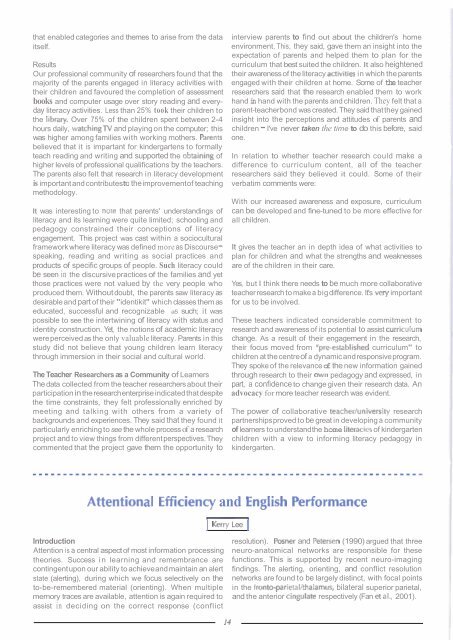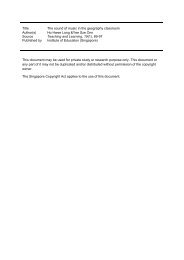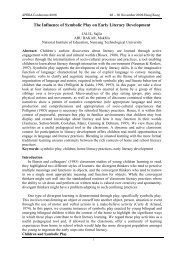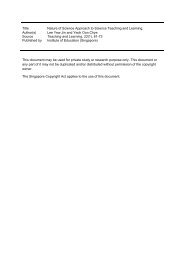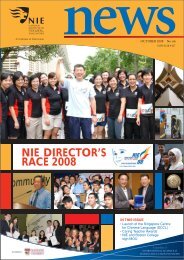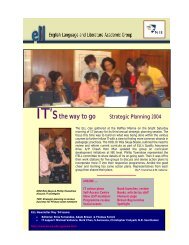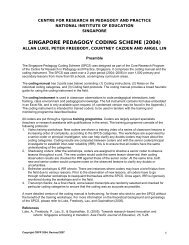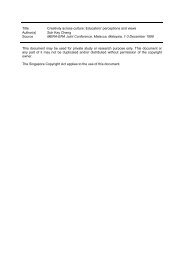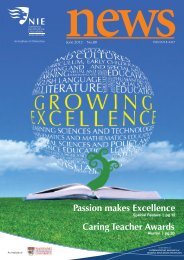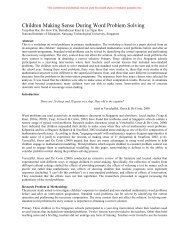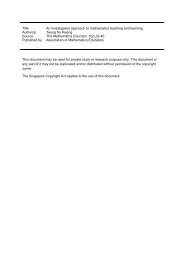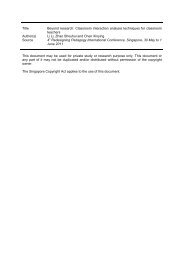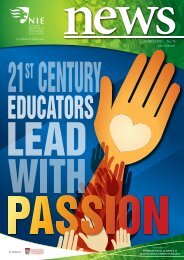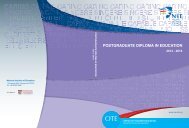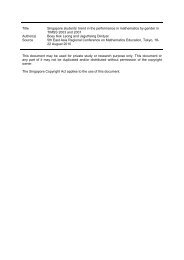Future EBuczttIomI Research: The - NIE Digital Repository - National ...
Future EBuczttIomI Research: The - NIE Digital Repository - National ...
Future EBuczttIomI Research: The - NIE Digital Repository - National ...
Create successful ePaper yourself
Turn your PDF publications into a flip-book with our unique Google optimized e-Paper software.
that enabled categories and themes to arise from the dataitself.ResultsOur professional community of researchers found that themajority of the parents engaged in literacy activities withtheir children and favoured the completion of assessmentbooks and computer usage over story reading and everydayliteracy activities. Less than 25% took their children tothe library. Over 75% of the children spent between 2-4hours daily, watchinglV and playing on the computer; thiswas higher among families with working mothers. hrentsbelieved that it is impartant for kindergartens to formallyteach reading and writing and supported the abtaining ofhigher levels of professional qualifications by the teachers.<strong>The</strong> parents also felt that research in literacy developmentis important and contributes to theimprovement of teachingmethodology.It was interesting to note that parents' understandings ofliteracy and its learning were quite limited; schooling andpedagogy constrained their conceptions of literacyengagement. This project was cast within a socioculturalframework where literacy was defined more as Discoursespeaking,reading and writing as social practices andproducts of specific groups of people. Such literacy couldbe seen in the discursive practices of the families and yetthose practices were not valued by the very people whoproduced them. Withoutdoubt, the parents saw literacy asdesirable and part of their "identikit" which classes them aseducated, successful and recognizable a5 such; it waspossible to see the intertwining of Iiteracy with status andidentity construction. Yet, the notions of academic literacywereperceived as the only valuable literacy. Parents in thisstudy did not believe that young children learn literacythrough immersion in their social and cultural world.<strong>The</strong> Teacher <strong>Research</strong>ers as a Community of Learners<strong>The</strong> data collected from the teacher researchers about theirparticipation inthe research enterprise indicated that despitethe time constraints, they felt professionally enriched bymeeting and talking with others from a variety ofbackgrounds and experiences. <strong>The</strong>y said that they found itparticularly enriching to see the whole process of a researchproject and to view things from different perspectives.<strong>The</strong>ycommented that the project gave them the opportunity tointerview parents to find out about the children's homeenvironment. This, they said, gave them an insight into theexpectation of parents and helped them to plan for thecurriculum that best suited the children. It also heightenedtheir awareness of the Iiteracy activities in which the parentsengaged with their children at home. Some of the teacherresearchers said that the research enabled them to workhand in hand with the parents and children. <strong>The</strong>y felt that aparent-teacher bond was created. <strong>The</strong>y said that they gainedinsight into the perceptions and attitudes of parents andchildren - I've never taken the time to do this before, saidone.In relation to whether teacher research could make adifference to curriculum content, all of the teacherresearchers said they believed it could. Some of theirverbatim comments were:With our increased awareness and exposure, curriculumcan be developed and fine-tuned to be more effective forall children.It gives the teacher an in depth idea of what activities toplan for children and what the strengths and weaknessesare of the children in their care.Yes, but I think there needs to be much more collaborativeteacher research to make a big difference. It's very importantfor us to be involved.<strong>The</strong>se teachers indicated considerable commitment toresearch and awareness of its potential to assist curricuIumchange. As a result of their engagement in the research,their focus moved from "pre-established curriculum" tochildren at the centreof a dynamic and responsive program.<strong>The</strong>y spoke of the relevance of the new information gainedthrough research to their awn pedagogy and expressed, inpart, a confidence to change given their research data. Anadvocacy for more teacher research was evident.<strong>The</strong> power of collaborative teacheduniversity researchpartnerships proved to be great in developing a communityof learners to understand the home iiteracies of kindergartenchildren with a view to informing literacy pedagogy inkindergarten.Attentional EfficiencyandI Kerry LeeEnglish PerformanceIIntroductionAttention is a central aspect of most information processingresolution). Posner and Petersen (1990) argued that threeneuro-anatomical networks are responsible for thesetheories. Success in learning and remembrance are functions. This is supported by recent neuro-imagingcontingent upon our ability to achieve and maintain an alert findings. <strong>The</strong> alerting, orienting, and conflict resolutionstate (alerting), during which we focus selectively on the networks are found to be largely distinct, with focal pointsto-be-remembered material (orienting). When multiplememory traces are available, attention is again required toin the fronto-parietal/thalamus, bilateral superior parietal,and the anterior cingulate respectively (Fan et al., 2001).assist in deciding on the correct response (conflict


